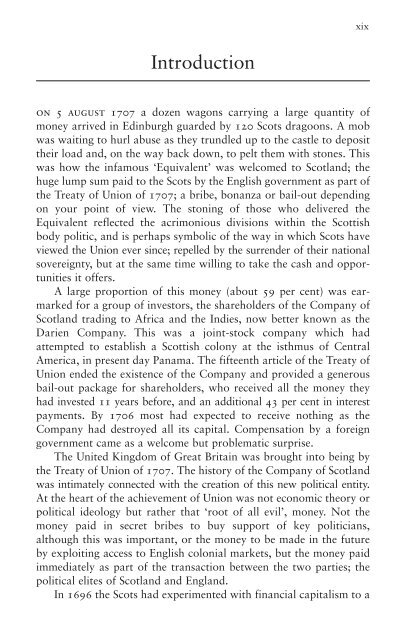Create successful ePaper yourself
Turn your PDF publications into a flip-book with our unique Google optimized e-Paper software.
<strong>Price</strong> <strong>of</strong> <strong>Scotland</strong> B format_Layout 1 03/11/2020 11:09 Page xix<br />
xix<br />
Introduction<br />
on 5 august 1707 a dozen wagons carrying a large quantity <strong>of</strong><br />
money arrived in Edinburgh guarded <strong>by</strong> 120 Scots dragoons. A mob<br />
was waiting to hurl abuse as they trundled up to the castle to deposit<br />
their load and, on the way back down, to pelt them with stones. This<br />
was how the infamous ‘Equivalent’ was welcomed to <strong>Scotland</strong>; the<br />
huge lump sum paid to the Scots <strong>by</strong> the English government as part <strong>of</strong><br />
the Treaty <strong>of</strong> Union <strong>of</strong> 1707; a bribe, bonanza or bail-out depending<br />
on your point <strong>of</strong> view. <strong>The</strong> stoning <strong>of</strong> those who delivered the<br />
Equivalent reflected the acrimonious divisions within the Scottish<br />
body politic, and is perhaps symbolic <strong>of</strong> the way in which Scots have<br />
viewed the Union ever since; repelled <strong>by</strong> the surrender <strong>of</strong> their national<br />
sovereignty, but at the same time willing to take the cash and opportunities<br />
it <strong>of</strong>fers.<br />
A large proportion <strong>of</strong> this money (about 59 per cent) was earmarked<br />
for a group <strong>of</strong> investors, the shareholders <strong>of</strong> the Company <strong>of</strong><br />
<strong>Scotland</strong> trading to Africa and the Indies, now better known as the<br />
Darien Company. This was a joint-stock company which had<br />
attempted to establish a Scottish colony at the isthmus <strong>of</strong> Central<br />
America, in present day Panama. <strong>The</strong> fifteenth article <strong>of</strong> the Treaty <strong>of</strong><br />
Union ended the existence <strong>of</strong> the Company and provided a generous<br />
bail-out package for shareholders, who received all the money they<br />
had invested 11 years before, and an additional 43 per cent in interest<br />
payments. By 1706 most had expected to receive nothing as the<br />
Company had destroyed all its capital. Compensation <strong>by</strong> a foreign<br />
government came as a welcome but problematic surprise.<br />
<strong>The</strong> United Kingdom <strong>of</strong> Great Britain was brought into being <strong>by</strong><br />
the Treaty <strong>of</strong> Union <strong>of</strong> 1707. <strong>The</strong> history <strong>of</strong> the Company <strong>of</strong> <strong>Scotland</strong><br />
was intimately connected with the creation <strong>of</strong> this new political entity.<br />
At the heart <strong>of</strong> the achievement <strong>of</strong> Union was not economic theory or<br />
political ideology but rather that ‘root <strong>of</strong> all evil’, money. Not the<br />
money paid in secret bribes to buy support <strong>of</strong> key politicians,<br />
although this was important, or the money to be made in the future<br />
<strong>by</strong> exploiting access to English colonial markets, but the money paid<br />
immediately as part <strong>of</strong> the transaction between the two parties; the<br />
political elites <strong>of</strong> <strong>Scotland</strong> and England.<br />
In 1696 the Scots had experimented with financial capitalism to a


















